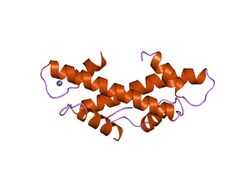Biology:TBP-associated factor
| TBP associated factor (TAF6) | |||||||||
|---|---|---|---|---|---|---|---|---|---|
 drosophila dtafii42/dtafii62 (like TAF6/TAF9) heterotetramer, HFD | |||||||||
| Identifiers | |||||||||
| Symbol | TAF | ||||||||
| Pfam | PF02969 | ||||||||
| Pfam clan | CL0012 | ||||||||
| InterPro | IPR004823 | ||||||||
| SCOP2 | 1bh9 / SCOPe / SUPFAM | ||||||||
| |||||||||
The TBP-associated factors (TAF) are proteins that associate with the TATA-binding protein in transcription initiation. It is a part of the transcription initiation factor TFIID multimeric protein complex. It also makes up many other factors, including SL1. They mediate the formation of the transcription preinitiation complex, a step preceding transcription of DNA to RNA by RNA polymerase II.
TAFs have a signature N-terminal histone-like fold domain (HFD).[1] This domain is implicated in the pairwise interaction among specific TAFs.[2]
Function
TFIID
TFIID plays a central role in mediating promoter responses to various activators and repressors. It binds tightly to TAFII-250 and directly interacts with TAFII-40. TFIID is composed of TATA binding protein (TBP) and a number of TBP-associated factors (TAFS).[3]
TAF is part of the TFIID complex, and interacts with the following:
- Specific transcriptional activators
- Basal transcription factors
- Other TAFIIs
- Specific DNA sequences, for example the downstream promoter element or gene-specific core promoter sequence
Due to such interactions, they contribute transcription activation and to promoter selectivity.[3]
Some pairs of TAF interact with each other to form "lobes" in TFIID. Pairs known or suggested to exist in TFIID include TAF6-TAF9, TAF4-TAF12, TAF11-13, TAF8-TAF10 and TAF3-TAF10.[2]
SL1
Selective factor 1 is composed of the TATA-binding protein and three TAF (TATA box-binding protein-associated factor) subunits (TAF1A, TAF1B, and TAF1C). These TAFs do not have a histone-like fold domain.[4]
Other complexes
This section is missing information about subunits of SAGA and related complexes, and pair-forming therein. (April 2019) |
TAF is a part of SAGA (SPT-ADA-GCN5 acetylase) and related coactivation complexes.[2] Such complexes acetylate histone tails to activate genes.[5] Human has three SAGA-like complexes: PCAF, TFTC (TBP-free TAF-containing complex), and STAGA (SPT3-TAF9-GCN5L acetylase). PCAF (GCN5) and KAT2A (GCN5L) are two human homologs of the yeast Gcn5.[6]
TAF8, TAF10, and SPT7L forms a small TAF complex called SMAT.[2]
Structure
The N-terminal domain of TAF has a histone-like protein fold. It contains two short alpha helices and a long central alpha helix.[1]
Human genes
This section is missing information about TAFs in non-TF2D complexes. (April 2019) |
- TAF1 (TAFII250)
- TAF2 (CIF150)
- TAF3 (TAFII140)
- TAF4 (TAFII130/135)
- TAF4B (TAFII105)
- TAF5 (TAFII100)
- TAF6 (TAFII70/80)
- TAF6L (PAF65A)
- TAF7 (TAFII55)
- TAF8 (TAFII43)
- TAF9 (TAFII31/32)
- TAF9B (TAFII31L)
- TAF10 (TAFII30)
- TAF11 (TAFII28)
- TAF12 (TAFII20/15)
- TAF13 (TAFII18)
- TAF15 (TAFII68)
Assorted signatures
TAF domains are spread out across many digital signatures:
References
- ↑ 1.0 1.1 "Structural similarity between TAFs and the heterotetrameric core of the histone octamer". Nature 380 (6572): 316–22. March 1996. doi:10.1038/380316a0. PMID 8598927. Bibcode: 1996Natur.380..316X.
- ↑ 2.0 2.1 2.2 2.3 "Identification of a small TAF complex and its role in the assembly of TAF-containing complexes". PLOS ONE 2 (3): e316. March 2007. doi:10.1371/journal.pone.0000316. PMID 17375202. Bibcode: 2007PLoSO...2..316D.
- ↑ 3.0 3.1 "Assembly of partial TFIID complexes in mammalian cells reveals distinct activities associated with individual TATA box-binding protein-associated factors". The Journal of Biological Chemistry 275 (38): 29847–56. September 2000. doi:10.1074/jbc.M002989200. PMID 10896937.
- ↑ "TBP-TAF complex SL1 directs RNA polymerase I pre-initiation complex formation and stabilizes upstream binding factor at the rDNA promoter". The Journal of Biological Chemistry 280 (33): 29551–8. August 2005. doi:10.1074/jbc.M501595200. PMID 15970593.
- ↑ "The SAGA coactivator complex acts on the whole transcribed genome and is required for RNA polymerase II transcription". Genes & Development 28 (18): 1999–2012. September 2014. doi:10.1101/gad.250225.114. PMID 25228644.
- ↑ "Human STAGA complex is a chromatin-acetylating transcription coactivator that interacts with pre-mRNA splicing and DNA damage-binding factors in vivo". Molecular and Cellular Biology 21 (20): 6782–95. October 2001. doi:10.1128/MCB.21.20.6782-6795.2001. PMID 11564863.
 |
